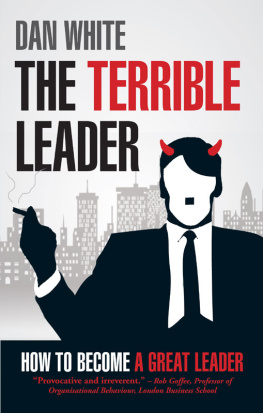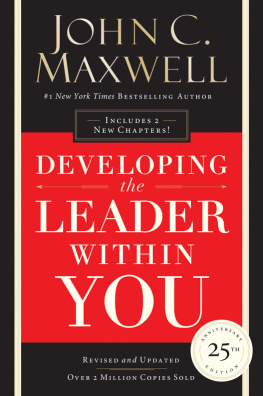HBR Press Quantity Sales Discounts
Harvard Business Review Press titles are available at significant quantity discounts when purchased in bulk for client gifts, sales promotions, and premiums. Special editions, including books with corporate logos, customized covers, and letters from the company or CEO printed in the front matter, as well as excerpts of existing books, can also be created in large quantities for special needs.
For details and discount information for both print and ebook formats, contact .
Copyright 2016 Harvard Business School Publishing
All rights reserved
No part of this publication may be reproduced, stored in or introduced into a retrieval system, or transmitted, in any form, or by any means (electronic, mechanical, photo-copying, recording, or otherwise), without the prior permission of the publisher. Requests for permission should be directed to , or mailed to Permissions, Harvard Business School Publishing, 60 Harvard Way, Boston, Massachusetts 02163.
First eBook Edition: August 2016
ISBN: 9781633691667
eISBN: 9781633691674
A hero ventures forth from the world of common day into a region of supernatural wonder: fabulous forces are there encountered and a decisive victory is won: the hero comes back from this mysterious adventure with the power to bestow boons on his fellow man.
Joseph Campbell, The Hero with a Thousand Faces
Since its publication in 2009, The Adventures of an IT Leader has been widely embraced, both by managers as a business book and by professors and students as a text used in university classes. At last report, more than 440 universities in more than 35 countries have adopted the book or some part of it in their IT management curriculum, and it has been translated into Japanese and Russian. We have been pleased with reviews of the book from media like the Wall Street Journal and from reader reviews on Amazon. It has played well in the corporate arena too: excerpts were published online by www.cio.com, and IT executives have weighed in to acknowledge its relevance to practice. An ongoing theme in many of the reviews suggests that the story itself is engaging; readers report having trouble putting the book down and that they stay awake long into the night to see what will happen.
So why a new edition? In recent years, especially the last few, we have received an increasing number of e-mails from people telling us they like the book, but that certain details, especially specific technologies, have aged badly.
As we all know, technology moves fast, and there is an unfortunate tendency (especially among students) to notice the obsolete details and conclude that the management lessons must be equally out-of-date. This is far from true, of course, as pretty much everyone who has written to us has said: the vast majority of the management lessons in the book remain as relevant as ever. Nevertheless, reader perceptions matter. So most of these e-mails closed with a request something like this: Please create a new edition with updated details.
That is exactly what we have done. Not only have we worked our way through the book to make updates, we have also tried to avoid using technical acronyms du jour and other details that might age badly. We believe this approach will ensure that the book remains relevant for many more years. Even more important, such an update is entirely consistent with a central theme of the book, stated in the opening chapter: The need for shrewd IT management does not vanish when overhyped technologies do.
In creating the new edition, we have carefully integrated some new material, too. Most notably, what used to be now addresses the challenges raised when people expect personal devices, such as smartphones, to interact with corporate systems. And the new chapter 17 explains how technology can be used to enhance an organizations innovative capabilities. As new business models and processes for value creation enabled by information technology continuously emerge, we thought it important to dedicate more of our attention to the subject of innovation.
In a similar vein, although off-premises IT management was very much a part of the original book, we felt that some unspoken presumptions about outsourcing had shifted in discussions of the cloud; this caused us to make subtle changes throughout the book, but especially in , on vendor partnering. We emphasize, however, that the management ideas on this topic in the original book were quite robust, so these changes are more shifts in tone and language than substance. Finally, we updated many exhibits and deleted a few.
The result is an updated and improved book that retains the features people liked about the original and continues to, as we like to say, relentlessly focus on IT as a management subject. The substance of the story has not changed. Our hero, Jim Barton, still makes classic errors, still learns from his mistakesor occasionally doesntand still strives to overcome his own limitations by building a strong IT management team. And, as before, he emerges transformed, a humbled but better IT leader.
A Note about Our Extended Narrative Approach
As pleased as weve been with the books popular reception, weve been equally pleased by the interest within the academic community for the special pedagogical approach we used, which we call the extended narrative approach.
Its development was something of a journey, and one that had an unlikely beginning. In 2005, two of us, Richard (Dick) and Robert (Rob), were co-chairing Harvard Business Schools executive program for chief information officers (CIOs). The topics and content for The Adventures of an IT Leader originally derived from our design for that program.
Its probably safe to say that this executive program, Delivering Information Services, held a venerated position in the IT industry. Dick cofounded the program in 1971 with HBS professors Neil Churchill, F. Warren McFarlan, and Jim McKenney. As a field, IT management is arguably barely fifty years old, but this program had been around for most of that time. Some companies sent many people to the program over the years, often right before they promoted those people into the CIO position. The alumni were a distinguished group, very prominent throughout the IT field. A number of them went on to become CEOs of their companies.
Thematically, the course tended to surprise people. Participants arrived expecting to talk about issues that they read about in the IT trade publications, but we focused instead on the business of IT, the part that would remain the same even as the acronyms and technologies changed with lightning speed.
We took the same approach to developing The Adventures of an IT Leader . As case teachers, we wanted to integrate short stories, to engage participants with the thematic content. But we had a hard time getting this to work in the traditional business book format, so we decided on a different tack. We started to write a long-form story, a book-length case, about a fictitious character and corporationa new CIO learning on the job. It would be fictitious in the sense of those Law and Order TV shows, addressing events that were fictionalized, but actually ripped from the headlinesthat is, drawn from our field case research on situations that had really happened in the world of IT.
This new path provided us with an initial jolt of renewed vigor. But then we hit another wall. This time, it was for a different reason: putting together the story of Jim Barton, our hapless CIO, required us to apply writing competencies akin to those of novelists as well as of business professors. We might have reverted to our standard book approach if our writing team had not been joined at that point by Shannon ODonnell.
Shannon had come to Harvard Business School by an unusual path. Previously, she had been a director and dramaturg at the Peoples Light and Theatre, a highly regarded professional theater company near Philadelphia. In one directing experience, Shannon had made use of the heros journey also known as the monomyth, an archetypal pattern within stories first described by Joseph Campbell in his 1949 book, The Hero with a Thousand Faces . Campbell points out that many of the worlds most important and impactful narratives share the same basic plot structure: a reluctant hero is called to action, refuses the call at first, then goes on a journey, along which he experiences a series of trials and temptations, then faces a major challenge, only to emerge transformed in the end.







